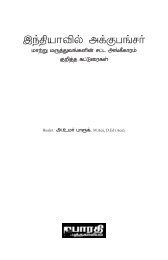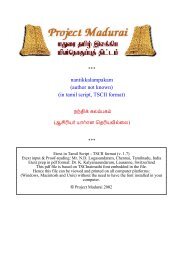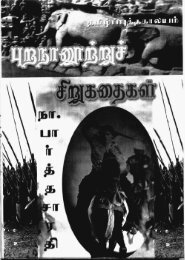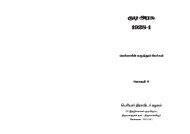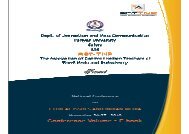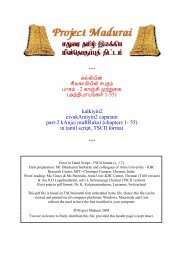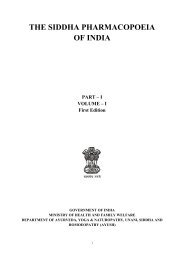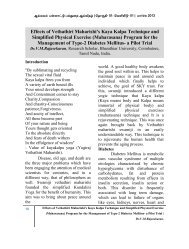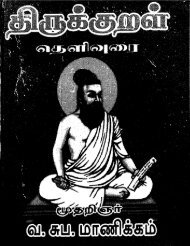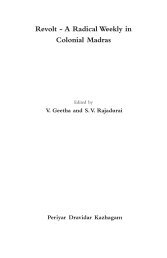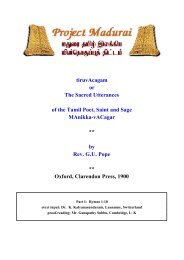- Page 1 and 2:
THE FUNDAMENTAL RULES OF THETAMIL N
- Page 3 and 4:
any person or class of persons, the
- Page 5 and 6:
(b) Government may issue orders, de
- Page 7 and 8:
They may be granted daily allowance
- Page 9 and 10:
Note.-The “Compensation Allowance
- Page 11 and 12:
RULINGS(i) A supernumerary post is
- Page 13 and 14:
production of such certificate and
- Page 15 and 16:
(9) In the Revenue Department where
- Page 17 and 18:
(b) Government may, at its option,
- Page 19 and 20:
Delegation under Rule 14-B.A head o
- Page 21 and 22:
9 Bore Well Foreman 2 days10. Sub-A
- Page 23 and 24:
PART III.CHAPTER IV-PAY.19. (1) The
- Page 25 and 26:
(4) Re-employed pensioners who are
- Page 27 and 28:
21. Time Scale Pay.—Rules 22 to 2
- Page 29 and 30:
in that rule be held to include his
- Page 31 and 32: (13) Note under Fundamental Rule 22
- Page 33 and 34: (26) The pay of a Government servan
- Page 35 and 36: (ii) a permanent or temporary post
- Page 37 and 38: Explanation 1.—Where a Government
- Page 39 and 40: (7) In cases where a Deputy Secreta
- Page 41 and 42: the posts. In such cases, the ‘pe
- Page 43 and 44: should state definitely the period
- Page 45 and 46: Engineers, Executive Engineers and
- Page 47 and 48: Note 3.—The Examiner of Local Fun
- Page 49 and 50: Definition of War Service.(a) Servi
- Page 51 and 52: Normal date of subsequent increment
- Page 53 and 54: Provided that on and with effect fr
- Page 55 and 56: (3) The intention of Rule 26(c) is
- Page 57 and 58: fixed with reference to ruling (4)
- Page 59 and 60: "Provided that in case of Governmen
- Page 61 and 62: Selection Grade Steno-Typist, grade
- Page 63 and 64: imposition of the penalty provided
- Page 65 and 66: Fixation of initial pay of a Govern
- Page 67 and 68: No allowance is admissible in the c
- Page 69 and 70: For the purpose of this Instruction
- Page 71 and 72: When there is any difference of opi
- Page 73 and 74: available for him, shall be charged
- Page 75 and 76: (c) the annual estimated charges fo
- Page 77 and 78: higher scales of pay, their enhance
- Page 79 and 80: the leave is extended beyond the si
- Page 81: (P.W.D. Memo. No.5199, Ac.24-C.P.,
- Page 85 and 86: Note 4.— The above Instruction do
- Page 87 and 88: 4. If the invention is made in the
- Page 89 and 90: RULINGS.Interpretation of the term
- Page 91 and 92: The reason for the non-grant of add
- Page 93 and 94: (2) In the case of Government serva
- Page 95 and 96: in addition, such compensatory allo
- Page 97 and 98: As regards recovery of overpayments
- Page 99 and 100: (5) In a case falling under sub-rul
- Page 101 and 102: (7) In a case falling under sub-rul
- Page 103 and 104: If no order is passed directing tha
- Page 105 and 106: service for the purpose of Pensiona
- Page 107 and 108: For the Government servantsin the T
- Page 109 and 110: Leave terms for Contract Officers.T
- Page 111 and 112: 68. Leave ordinarily begins on the
- Page 113 and 114: (2) No Government servant belonging
- Page 115 and 116: Section IV—Grant of Leave.76. A l
- Page 117 and 118: (d) The maximum period of continuou
- Page 119 and 120: to be infected with the disease.
- Page 121 and 122: (c) Medical and Forest Officers sol
- Page 123 and 124: Combination of leave with vacation.
- Page 125 and 126: duepromptitude in bringing it to no
- Page 127 and 128: (5) The Government servants, who ar
- Page 129 and 130: (2) ascertained in writing from the
- Page 131 and 132: SECTION V—Leave Salary.87. Subjec
- Page 133 and 134:
Interpretation of the words “at t
- Page 135 and 136:
calculated after taking into accoun
- Page 137 and 138:
provisions should have completed on
- Page 139 and 140:
4. If the detention in hospital was
- Page 141 and 142:
not an interruption of duty for the
- Page 143 and 144:
RULINGS.Leave to an apprentice.(1)
- Page 145 and 146:
(5) The joining time admissible to
- Page 147 and 148:
(b) When such extension is consider
- Page 149 and 150:
(4) Transfers which do not involve
- Page 151 and 152:
Declaration........................
- Page 153 and 154:
PART V.CHAPTER XII—FOREIGN SERVIC
- Page 155 and 156:
(xvii) “The Collectors of the con
- Page 157 and 158:
113. A Government servant transferr
- Page 159 and 160:
(a) For employeesin receipt ofGrade
- Page 161 and 162:
(ii) If a deputationistopts forthe
- Page 163 and 164:
The deputationists are permitted to
- Page 165 and 166:
particular remuneration or concessi
- Page 167 and 168:
Government and if he avails himself
- Page 169 and 170:
Explanation 2.—The rate of contri
- Page 171 and 172:
Tamil Nadu Animal Husbandry Service
- Page 173 and 174:
efore his retirement, has to be tak
- Page 175 and 176:
120. A Government servant in foreig
- Page 177 and 178:
126. When a Government servant reve
- Page 179 and 180:
(8) In the case of establishments c
- Page 181 and 182:
(20) In the case of establishments
- Page 183 and 184:
Commissioner forRevenueAdministrati
- Page 185 and 186:
7 General trainingprior to confirma
- Page 187 and 188:
2 Training in thePolice RecruitsSch
- Page 189 and 190:
in the Police Radiobranch.(v) Lance
- Page 191 and 192:
4 Girl Guide Training Women officer
- Page 193 and 194:
10 Auxiliary CadetCorps periodspent
- Page 195 and 196:
16 Training in DentalSurgeryDo.Do.1
- Page 197 and 198:
23 Orientationtraining at theOrient
- Page 199 and 200:
Authorities in thecase of SanitaryI
- Page 201 and 202:
4 Training in the FireFighting at t
- Page 203 and 204:
undergoing thetraining will beeligi
- Page 205 and 206:
8. Period ofattachment of CivilOffi
- Page 207 and 208:
Training College,Madras.(G.O. Ms. N
- Page 209 and 210:
Chest measurement in centimeters on
- Page 211 and 212:
Name and rank of officer granting t
- Page 213 and 214:
not lower than that of an Assistant
- Page 215 and 216:
Form under Fundamental Rule 10.(For
- Page 217 and 218:
thereof, on which leave was granted
- Page 219 and 220:
(vi) The reference to the Medical b
- Page 221 and 222:
him, whether the applicant should g
- Page 223 and 224:
Government servants in foreign serv
- Page 225 and 226:
SECTION VIII-RETURN FROM LEAVE.42.
- Page 227 and 228:
should also invariably give necessa
- Page 229 and 230:
Note.—The Superintendent in charg
- Page 231 and 232:
Leave account ofDate of commencemen
- Page 233 and 234:
RULING.Where leave of the same natu
- Page 235 and 236:
Note.—If the break in the service
- Page 237 and 238:
(b) the average monthly pay plus sp
- Page 239 and 240:
(vi) in cases where the Govt. Serva
- Page 241 and 242:
compulsory leave during the period
- Page 243 and 244:
(2) The instructions in ruling (1)
- Page 245 and 246:
(1) Please see ruling (1) under Rul
- Page 247 and 248:
(d) Non-permanent Government servan
- Page 249 and 250:
RULINGS.Scope of Rule 25.(1) Govern
- Page 251 and 252:
(2) The initial period of such leav
- Page 253 and 254:
(c) A Government servant in basic s
- Page 255 and 256:
PART-I—EARNED LEAVEDate of commen
- Page 257 and 258:
PART IV—STUDY LEAVEDates Period P
- Page 259 and 260:
(b) The term “Fundamental Rule 85
- Page 261 and 262:
(i) Leave on full pay limited to on
- Page 263 and 264:
servant should be granted. The gran
- Page 265 and 266:
Government servant concerned takes
- Page 267 and 268:
“Special Casual Leave not exceedi
- Page 269 and 270:
APPENDIX II.PART I.R u l e 9 .Subsi
- Page 271 and 272:
(16) Demonstration Maistries, Grade
- Page 273 and 274:
4. Director of Agriculture .. All G
- Page 275 and 276:
Tribal Welfare, Director ofBackward
- Page 277 and 278:
of Prohibition and Excise,Commissio
- Page 279 and 280:
(G.O. Ms. No. 856, Personneland Adm
- Page 281 and 282:
(7) Power to sanction thewriting of
- Page 283 and 284:
eceived for the work by thesaid col
- Page 285 and 286:
discharge current duties of that po
- Page 287 and 288:
Chief Engineer (Highways) is also e
- Page 289 and 290:
(6) Gazetted Superintendent, Second
- Page 291 and 292:
51. The Director of School Educatio
- Page 293 and 294:
NOTE 5 : UNDER FUNDAMENTAL RULE 51.
- Page 295 and 296:
RULE 84.ANNEXURE.Study Leave Rules1
- Page 297 and 298:
India .. .. Half of the full daily
- Page 299 and 300:
The TableSl.No Kinds of Higher Stud
- Page 301 and 302:
FORM A.(See Rule 17.)Bond for perma
- Page 303 and 304:
FORM B.(See Rule 17.)Bond for non-p
- Page 305 and 306:
AND WHEREAS the said sureties have
- Page 307 and 308:
military training should be taken i
- Page 309 and 310:
appointments in the first grade. Th
- Page 311 and 312:
(ii) while on leave in India, Burma
- Page 313 and 314:
(i) For the first month—full civi
- Page 315 and 316:
Appointment of substitutes.—The H
- Page 317 and 318:
3. Extraordinary leave may be grant
- Page 319 and 320:
1 Pharmacist, Pharmacology Departme
- Page 321 and 322:
Additional remuneration to the memb



